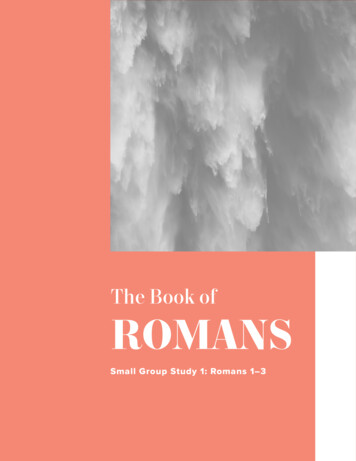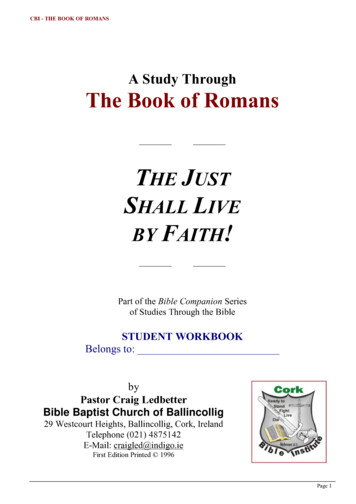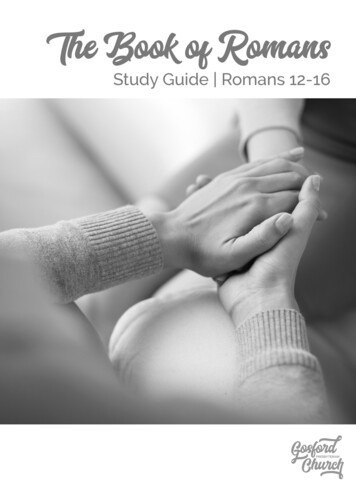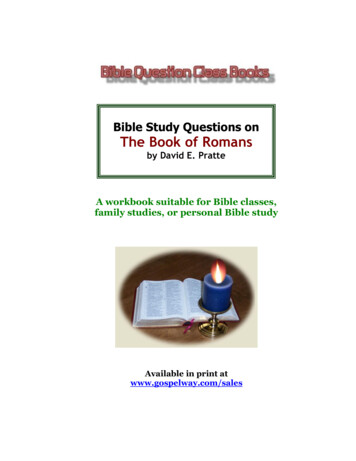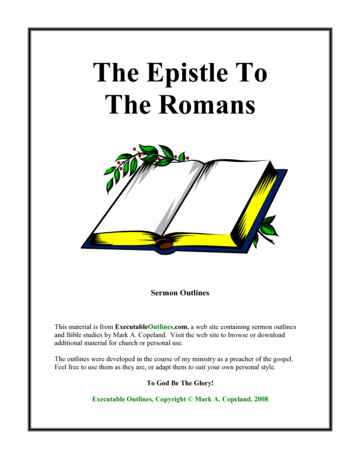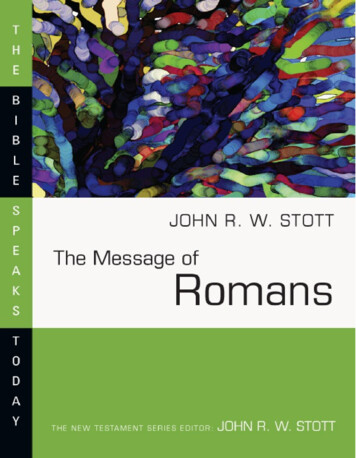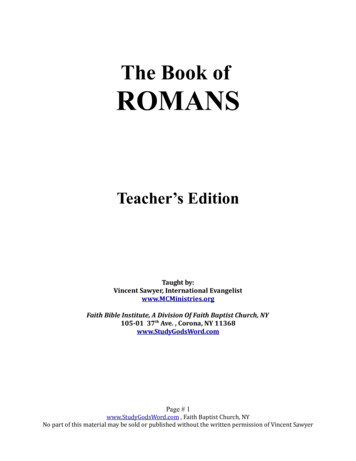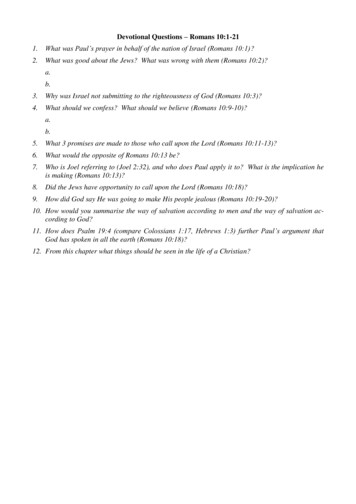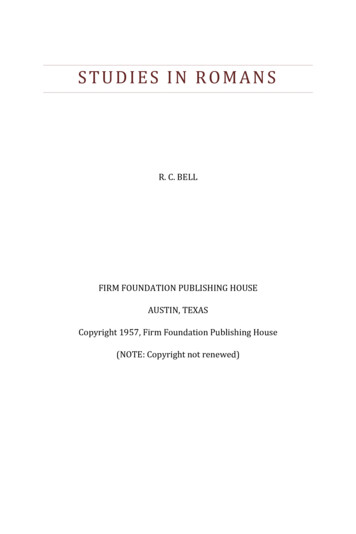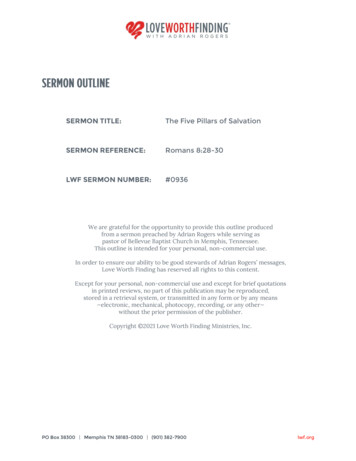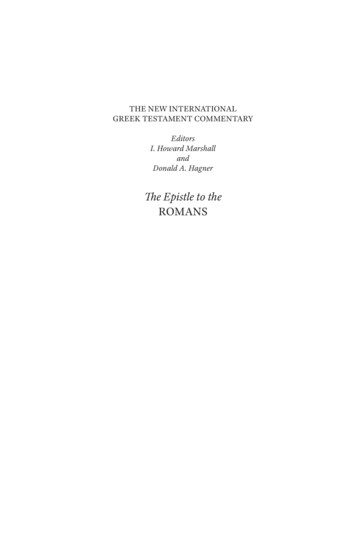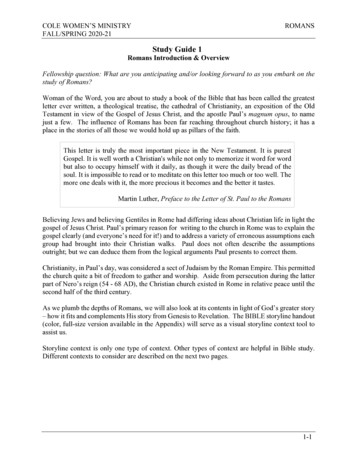
Transcription
COLE WOMEN’S MINISTRYFALL/SPRING 2020-21ROMANSStudy Guide 1Romans Introduction & OverviewFellowship question: What are you anticipating and/or looking forward to as you embark on thestudy of Romans?Woman of the Word, you are about to study a book of the Bible that has been called the greatestletter ever written, a theological treatise, the cathedral of Christianity, an exposition of the OldTestament in view of the Gospel of Jesus Christ, and the apostle Paul’s magnum opus, to namejust a few. The influence of Romans has been far reaching throughout church history; it has aplace in the stories of all those we would hold up as pillars of the faith.This letter is truly the most important piece in the New Testament. It is purestGospel. It is well worth a Christian's while not only to memorize it word for wordbut also to occupy himself with it daily, as though it were the daily bread of thesoul. It is impossible to read or to meditate on this letter too much or too well. Themore one deals with it, the more precious it becomes and the better it tastes.Martin Luther, Preface to the Letter of St. Paul to the RomansBelieving Jews and believing Gentiles in Rome had differing ideas about Christian life in light thegospel of Jesus Christ. Paul’s primary reason for writing to the church in Rome was to explain thegospel clearly (and everyone’s need for it!) and to address a variety of erroneous assumptions eachgroup had brought into their Christian walks. Paul does not often describe the assumptionsoutright; but we can deduce them from the logical arguments Paul presents to correct them.Christianity, in Paul’s day, was considered a sect of Judaism by the Roman Empire. This permittedthe church quite a bit of freedom to gather and worship. Aside from persecution during the latterpart of Nero’s reign (54 - 68 AD), the Christian church existed in Rome in relative peace until thesecond half of the third century.As we plumb the depths of Romans, we will also look at its contents in light of God’s greater story– how it fits and complements His story from Genesis to Revelation. The BIBLE storyline handout(color, full-size version available in the Appendix) will serve as a visual storyline context tool toassist us.Storyline context is only one type of context. Other types of context are helpful in Bible study.Different contexts to consider are described on the next two pages.1-1
ROMANSCOLE WOMEN’S MINISTRYFALL/SPRING 2020-21Context ToolsContext is the circumstance that forms the setting for an event, statement, or idea. Understandingthe circumstance(s) is key to understanding the meaning of what is being communicated.Always approach Scripture keeping in mind its literary genre, time setting, and place within God’sbigger picture.Consider:1. Literary Style [writing genre] – some books of the Bible are more than one type Narrative (The Law, History) Poetry (Poems, Songs, Wisdom, Prophetic) Prose Discourse [persuasive writing] (The Law, Wisdom, Letters)GOD’S UNIFIED STORYThe Bible as a Bookshelf1-2
COLE WOMEN’S MINISTRYFALL/SPRING 2020-21ROMANS2. Time Context – What did the message mean back in its time? (Turn back the clock!)3. Storyline (What pieces of God’s story do you see here?)How does thepassage connectwith otherScripture?How does thepassage apply tothe body today?ScripturalChristChurchFutureHow does thepassage pointtoward Jesus?What does thepassage mean forthe future?1-3
ROMANSCOLE WOMEN’S MINISTRYFALL/SPRING 2020-21Literary Context of RomansIn the early history of the church, it was common practice for the apostles and church fathers tosend epistles, or letters to encourage and instruct regional bodies of believers or individuals. Theseletters were often then sent on to other churches for their edification. There are twenty-one epistlesin the New Testament, fulfilling an aspect of Jesus’ call to the apostles (Acts 1:8) to serve aswitnesses to the world about Him. Paul’s tone in his letter to the church in Rome is that of ashepherd tending to the flock. Paul desired the church to fully understand the gospel and to livetheir lives in light of that truth. Paul’s letter to the Romans was written in the literary style ofprose discourse – persuasive writing linking and building on thoughts to lead or call readers intoaction.Each epistle was written to speak into a specific situational context. Because the recipient(s)already understood the situational context, the writer does not usually explain it in his letter. Assuch, we must rely on clues within the text and historians for contextual insight, aiming tounderstand it through a cultural lens of their time rather than ours of today. You, as a seeker oftruth, are encouraged to glean, as much as possible, the context from the text itself. You are alsoinvited to supplement that context by researching the historical, geographical, cultural, andsituational context as we journey through Romans together.To begin, enjoy reading the book of Romans in its entirety to get a flavor of Paul’s writing style.As you read, focus on getting a sense of Paul’s overall message in his letter to the believers inRome at the time.1. Paul’s letter follows the customary structure of its time period. Briefly, jot your firstimpressions: (Use the provided divisions below, or create your own.)OPENING (Romans 1:1-15)Sender:Expressions of Prayer & Thanksgiving:Recipients:BODY (Romans 1:16-15:21)Romans 1:16-4:251-4
COLE WOMEN’S MINISTRYFALL/SPRING 2020-21ROMANSRomans 5:1 – 8:39Romans 9:1 -11:36Romans 12:1-15:21CLOSING (Romans 15:22-16:27)1-5
ROMANSCOLE WOMEN’S MINISTRYFALL/SPRING 2020-212. What can you glean from Romans that gives clues about when Paul wrote this letter?3. What reasons does Paul give for writing to the church in Rome? (See chapters 1, 15, 16.)4. In what ways is Paul hoping to partner with the believers in Rome? (15:23-24)FOR FURTHER DISCUSSION OR CONTEMPLATION:I) Sometimes Paul refers to the Lord as Christ Jesus; other times he writes Jesus Christ.What, if any, difference do you see between these titles? What could be Paul’s intentbehind why he sometimes uses one and sometimes the other?ADDITIONAL -in-the-bible-how-to-read-the-bible-3/&1-6Cole Women’s Bible Study Writing Team, 2020
COLE WOMEN’S MINISTRYFALL/SPRING 2020-21ROMANSStudy Guide 2Romans 1:1-17Fellowship question: In three or four sentences, how did you come to know the Lord?OBSERVATION – Lord, help me to discover it!Read Romans 1:1-17.1. List everything the passage tells you about Paul, including his identity and purpose.2. List everything you discover about the Roman believers from the passage. (Include theiridentity(ies) and reputation as a church.)3. Re-read Romans 1:1-17, marking/highlighting every mention of the gospel. How does Pauldescribe the gospel?4. List everything you discover about faith from the passage.2-1
ROMANSReread the passage; what else stands out?COLE WOMEN’S MINISTRYFALL/SPRING 2020-21Skill BuilderFurther ObservationsThemes (Main Ideas)INTERPRETATION – Lord, help me to understand it.Time ContextWe first meet Saul (Paul) of Tarsus in Acts 7. At that time as a devout Pharisee, he went by hisHebrew name, Saul. Pharisees were a sect of the Jewish faith who observed strict obedience tothe Mosaic Law. Saul had been trained by Gamaliel, a well-respected rabbi, and he himself wasregarded with great respect. In Acts 7:58, we read of Saul’s persecution of a Christ follower namedStephen. From Acts 8:3 we then see Saul, “ravaging the church, entering house after house, anddragging off men and women, he would put them in prison.” After Jesus appeared to Saul in Acts9, and the subsequent transformation of his heart and mind, this man of passion begin to channelhis zeal for Christ’s namesake as a new man: Paul, the apostle and bond-servant of Christ Jesus(Romans 1:1).Boldly and without hindrance, Paul spread the good news as a traveling missionary. He wroteRomans from Corinth during the early reign of Roman Emperor Nero. Nero ruled and controlledthe Roman Empire, which covered an expansive area of land all around the Mediterranean Sea.(See the dotted line in Figure 2-1.) Paul’s desire was to continue to travel to Spain, the westernreaches of the Roman Empire, passing through Rome. Paul had planted many churches during hismissionary journeys, but the church in Rome was not one of them. Founders of the church inRome are unknown. It is believed by many commentators that Christ followers had heard the goodnews elsewhere before arriving in Rome, in turn organically planting the church in Rome.2-2
COLE WOMEN’S MINISTRYFALL/SPRING 2020-21ROMANSFigure 2-1Roman Empire(presented in accordance with Bible History Online’s terms of use)5. Deep Insight Questions:a. What is a believer’s call? (As a place to start, see the following: Romans 1:5-7, 16-17; 1Corinthians 1:9; Galatians 1:6; 1 Corinthians 7:15, 17; Galatians 5:13; Colossians 3:15; 1Thessalonians 4:7; Romans 12:3-8. Cross references are provided at the end of each Guide.The text of Romans is a separate handout.)b. How does Scripture further define the gospel? (For some insight, see the following crossreferences: Matthew 4:23; Luke 9:2; 6, Acts 20:24, 25; Acts 8:12; 1 Corinthians 15:1-8;Romans 14:17; 1 Corinthians 4:20).2-3
ROMANSCOLE WOMEN’S MINISTRYFALL/SPRING 2020-21Storyline Tool (mentioned in Study Guide 1)Skill Builder6. Look a few years after the writing of Romans and read Acts 26:4-23, in which Paul is givinghis defense before King Agrippa. Paul shared his life story as his testimony.a. How did Paul describe his life before his encounter with Jesus?b. According to Acts 26:15-18, how did Paul describe his call from the Lord?c. What was Paul’s response to Jesus’ call? See Acts 26:19-23.2-4
COLE WOMEN’S MINISTRYFALL/SPRING 2020-21ROMANSSkill BuilderIdentify Spiritual Principles:(Statements about the themes/main ideas and/or God’s character that are applicable across timeand culture.)What spiritual principles have you learned from God’s Word in this passage?APPLICATION – Lord, help me to live it!7. Reflect: What is my identity? What is my purpose? In what ways do I walk in the truth aboutmy identity and purpose? In what areas do I need to refocus?8. Reflect: What is the Christian Church’s reputation today? My church’s reputation? Myfamily’s? My personal? What should each’s reputation be?2-5
ROMANSFurther Applications:COLE WOMEN’S MINISTRYFALL/SPRING 2020-21Skill BuilderFOR FURTHER DISCUSSION OR CONTEMPLATION:I) What does it mean that the gospel is a message of continual relevance in a believer’s faithwalk rather than a one-time message at conversion?II) How would you describe God’s overall story from creation to our future glory in as fewwords as possible to a non-believer?ADDITIONAL eligion.html&Cole Women’s Bible Study Writing Team, 2020Cross References for Study Guide 2(Excluding Romans references; Romans has its own handout.)1 Corinthians 1:99God is faithful, through whom you were called into fellowship with His Son, Jesus Christour Lord.Galatians 1:66I am amazed that you are so quickly deserting Him who called you by the grace of Christ,for a different gospel;1 Corinthians 7:1515Yet if the unbelieving one leaves, let him leave; the brother or the sister is not underbondage in such cases, but God has called us to peace.1 Corinthians 7:1717Only, as the Lord has assigned to each one, as God has called each, in this manner let himwalk. And so I direct in all the churches.2-6
COLE WOMEN’S MINISTRYFALL/SPRING 2020-21ROMANSGalatians 5:1313For you were called to freedom, brethren; only do not turn your freedom into anopportunity for the flesh, but through love serve one another.Colossians 3:1515Let the peace of Christ rule in your hearts, to which indeed you were called in one body;and be thankful.1 Thessalonians 4:77For God has not called us for the purpose of impurity, but in sanctification.Matthew 4:2323Jesus was going throughout all Galilee, teaching in their synagogues and proclaimingthe gospel of the kingdom, and healing every kind of disease and every kind of sicknessamong the people.Luke 9:22And He sent them out to proclaim the kingdom of God and to perform healing.Luke 9:66Departing, they began going throughout the villages, preaching the gospel and healingeverywhere.Acts 20:24-2524But I do not consider my life of any account as dear to myself, so that I may finish mycourse and the ministry which I received from the Lord Jesus, to testify solemnly of thegospel of the grace of God. 25 “And now, behold, I know that all of you, among whom Iwent about preaching the kingdom, will no longer see my face.Acts 8:1212But when they believed Philip preaching the good news about the kingdom of God andthe name of Jesus Christ, they were being baptized, men and women alike.1 Corinthians 15:1-815 Now I make known to you, brethren, the gospel which I preached to you, which also youreceived, in which also you stand, 2 by which also you are saved, if you hold fast the wordwhich I preached to you, unless you believed in vain.3For I delivered to you as of first importance what I also received, that Christ died for oursins according to the Scriptures, 4 and that He was buried, and that He was raised on thethird day according to the Scriptures, 5 and that He appeared to Cephas, then to thetwelve. 6 After that He appeared to more than five hundred brethren at one time, most ofwhom remain until now, but some have fallen asleep; 7 then He appeared to James, thento all the apostles; 8 and last of all, as to one untimely born, He appeared to me also.1 Corinthians 4:2020For the kingdom of God does not consist in words but in power.2-7
ROMANSCOLE WOMEN’S MINISTRYFALL/SPRING 2020-21Acts 26:4-234“So then, all Jews know my manner of life from my youth up, which from the beginningwas spent among my own nation and at Jerusalem; 5 since they have known about me for along time, if they are willing to testify, that I lived as a Pharisee according to thestrictest sect of our religion. 6 And now I am standing trial for the hope of the promise madeby God to our fathers; 7 the promise to which our twelve tribes hope to attain, as theyearnestly serve God night and day. And for this hope, O King, I am being accused byJews. 8 Why is it considered incredible among you people if God does raise the dead?9“So then, I thought to myself that I had to do many things hostile to the name of Jesus ofNazareth. 10 And this is just what I did in Jerusalem; not only did I lock up many ofthe saints in prisons, having received authority from the chief priests, but also when theywere being put to death I cast my vote against them. 11 And as I punished them often in allthe synagogues, I tried to force them to blaspheme; and being furiously enraged at them, Ikept pursuing them even to foreign cities.12“While so engaged as I was journeying to Damascus with the authority and commission ofthe chief priests, 13 at midday, O King, I saw on the way a light from heaven, brighter thanthe sun, shining all around me and those who were journeying with me. 14 And when wehad all fallen to the ground, I heard a voice saying to me in the Hebrew dialect, ‘Saul, Saul,why are you persecuting Me? It is hard for you to kick against the goads.’ 15 And I said,‘Who are You, Lord?’ And the Lord said, ‘I am Jesus whom you are persecuting. 16 But getup and stand on your feet; for this purpose I have appeared to you, to appoint you a ministerand a witness not only to the things which you have seen, but also to the things in which Iwill appear to you; 17 rescuing you from the Jewish people and from the Gentiles, to whom Iam sending you, 18 to open their eyes so that they may turn from darkness to light and fromthe dominion of Satan to God, that they may receive forgiveness of sins and an inheritanceamong those who have been sanctified by faith in Me.’19“So, King Agrippa, I did not prove disobedient to the heavenlyvision, 20 but kept declaring both to those of Damascus first, and also at Jerusalemand then throughout all the region of Judea, and even to the Gentiles, that they should repentand turn to God, performing deeds appropriate to repentance. 21 For thisreason some Jews seized me in the temple and tried to put me to death. 22 So, havingobtained help from God, I stand to this day testifying both to small and great, stating nothingbut what the Prophets and Moses said was going to take place; 23 that the Christ was tosuffer, and that by reason of His resurrection from the dead He would be the first toproclaim light both to the Jewish people and to the Gentiles.”V2-8
COLE WOMEN’S MINISTRYFALL/SPRING 2020-21ROMANSStudy Guide 3Romans 1:18-32Fellowship question: Is ignorance ever an acceptable excuse?OBSERVATION – Lord, help me to discover it!Read Romans 1:18-32.1. List your observations from the text about God. Include His attributes and His actions.2. What are the root causes of unrighteousness highlighted in this passage? (Look closely atverses 1:21, 25, 28.)3. Describe the progression in the text that ultimately leads to being worthy of death (verse 1:32).4. What characteristics do you see in the sins which Paul highlights? A couple of examples aregiven to get you started. Involve heart, body, and mind – no aspect of being human is absent. Mankind does not only commit the sins, it gives approval to others who do. 3-1
ROMANSReread the passage; what else stands out?COLE WOMEN’S MINISTRYFALL/SPRING 2020-21Skill BuilderFurther ObservationsThemes (Main Ideas)INTERPRETATION – Lord, help me to understand it.1. Let’s look a little deeper at the meanings of a few key words. Using resources available toyou: a dictionary, a Bible dictionary/encyclopedia, and/or a Bible study website such asblueletterbible.org, define the following words: (Entries from the book, Vine’s ExpositoryDictionary, which are also made freely available in blueletterbible.org’s verse study tools,are extremely useful. You may also access Vine’s definitions online )a) Truth (v18, 25) (alētheia, Strongs 225)b) Glory (v23) (doxa, Strongs 1391)3-2
COLE WOMEN’S MINISTRYFALL/SPRING 2020-21ROMANSc) Wrath (v18) (orgé, Strongs 3709)d) Unrighteousness (v18, 29) (adikia, Strongs 93)e) Futile (v21) (mataioó, Strongs 3154)f) Depraved (v28) (adokimos Strongs 96)5. How is the wrath of God being revealed? (v18) (Note the use of a present tense verb.)3-3
ROMANSCOLE WOMEN’S MINISTRYFALL/SPRING 2020-21Storyline ToolSkill BuilderReflect a bit on God’s creation and His holiness. When you’re ready, enjoy Psalm 19.6. What invisible qualities of God have been made known via creation?7. What does Psalm 19 add to your understanding of God’s standard of righteousness?3-4
COLE WOMEN’S MINISTRYFALL/SPRING 2020-21ROMANSSkill BuilderIdentify Spiritual Principles:(Statements about the themes/main ideas and/or God’s character that are applicable across timeand culture.)What spiritual principles have you learned from God’s Word in this passage?APPLICATION – Lord, help me to live it!8. How does humanity give glory (weight, value) to things other than God today? Can youidentify any examples from your own life? (You may need to consider what consumes yourtime.) What tangible steps can you take to realign your thinking to God’s perspective?9.Reflect: What is my typical response when I detect idol worship in other people? How mightGod desire me to respond that would draw others to Him? (Keep this in mind for Romans 2!)3-5
Women’sCOLEBIBLE STUDYDiscoverÎ CONNECT ÓTransformCole Community Church8775 West Ustick Road l Boise, Idaho 83704208.375.3565www.colecommunity.orgROMANSFall 2020 - Spring 2021COLE WOMEN’S MINISTRY grants permission for any of their Bible studymaterials to be photocopied for use in a local congregation or small group,provided the material is distributed free/at cost, the copies indicate the source isCOLE WOMEN’S MINISTRY, and the authors’ names are included in the StudyGuide packet.
COLE WOMEN’S MINISTRYFALL/SPRING 2019-20ROMANSTABLE OF CONTENTSStudy Guide 1 – Overview. . . . . . . . . . 1-1Study Guide 13 – Romans 7. . . . . . . . 13-1Study Guide 2 – Romans 1:1-17 . . . . . 2-1Study Guide 14 – Romans 8:1-25 . . . 14-1Study Guide 3 – Romans 1:18-32 . . . . 3-1Study Guide 15 – Romans 8:26-39 . . 15-1Study Guide 4 – Romans 2:1-16 . . . . 4-1Study Guide 16 – Romans 9 . . . . . . . .16-1Study Guide 5 – Romans 2:17-29 . . . . 5-1Study Guide 17 – Romans 10 . . . . . . . 17-1Study Guide 6 – Romans 3:1-20 . . . . . 6-1Study Guide 18 – Romans 11:1-10 . . 18-1Study Guide 7 – Romans 3:21-31. . . . . 7-1Study Guide 19 – Romans 11:11-36 . .19-1Study Guide 8 – Romans 4:1-12 . . . . . 8-1Study Guide 20 – Romans 12 . . . . . . 20-1Study Guide 9 – Romans 4:13-25. . . . . 9-1Study Guide 21 – Romans 13 . . . . . . 21-1Study Guide 10 – Romans 5:1-11 . . . .10-1Study Guide 22 – Romans 14 . . . . . . 22-1Study Guide 11 – Romans 5:12-2 . . . .11-1Study Guide 23 – Romans 15:1-13 . . 23-1Study Guide 12 – Romans 6. . . . . . . . 12-1Study Guide 24 – Romans 15:14-33 . .24-1Study Guide 25 – Romans 16 . . . . . . 25-1ii
COLE WOMEN’S MINISTRYFALL/SPRING 2020-21ROMANSAPPENDICESAppendix A . . . . . . . . . . . . . . .BIBLE Story Line ToolA-1Appendix B . . . . . . . . . . . . . . .Events in Paul’s LifeB-1This Romans study was written by Jen Binford and Mary Ann Porter, in collaboration withJan Nielson. (2020)Cross references provided at the end of study guides is from:New American Standard Bible (NASB)Copyright 1960, 1962, 1963, 1968, 1971, 1972, 1973, 1975, 1977, 1995 byThe Lockman FoundationIn accordance with terms of use.iii
COLE WOMEN’S MINISTRYFALL/SPRING 2020-21ROMANSThis page intentionally left blank.iv
ROMANSCOLE WOMEN’S MINISTRYFALL/SPRING 2020-21Further Applications:FOR FURTHER DISCUSSION OR CONTEMPLATION:I)How is God’s wrath different from human anger?II) What choice has humanity consistently faced since the time of creation?ADDITIONAL y/the-wrath-of-god/&Cole Women’s Bible Study Writing Team, 2020Scripture for Study Guide 3Psalm 19For the choir director. A Psalm of David.19 The heavens are telling of the glory of God;And their expanse is declaring the work of His hands.2Day to day pours forth speech,And night to night reveals knowledge.3There is no speech, nor are there words;Their voice is not heard.4Their line has gone out through all the earth,And their utterances to the end of the world.In them He has placed a tent for the sun,5Which is as a bridegroom coming out of his chamber;It rejoices as a strong man to run his course.3-6Skill Builder
COLE WOMEN’S MINISTRYFALL/SPRING 2020-216ROMANSIts rising is from one end of the heavens,And its circuit to the other end of them;And there is nothing hidden from its heat.7The law of the LORD is perfect, restoring the soul;The testimony of the LORD is sure, making wise the simple.8The precepts of the LORD are right, rejoicing the heart;The commandment of the LORD is pure, enlightening the eyes.9The fear of the LORD is clean, enduring forever;The judgments of the LORD are true; they are righteous altogether.10They are more desirable than gold, yes, than much fine gold;Sweeter also than honey and the drippings of the honeycomb.11Moreover, by them Your servant is warned;In keeping them there is great reward.12Who can discern his errors? Acquit me of hidden faults.13Also keep back Your servant from presumptuous sins;Let them not rule over me;Then I will be blameless,And I shall be acquitted of great transgression.14Let the words of my mouth and the meditation of my heartBe acceptable in Your sight,O LORD, my rock and my Redeemer.V3-7
ROMANSThis page intentionally left blank3-8COLE WOMEN’S MINISTRYFALL/SPRING 2020-21
COLE WOMEN’S MINISTRYFALL/SPRING 2020-21ROMANSStudy Guide 4Romans 2:1-16Fellowship question: What comes to mind when you think about judgement?OBSERVATION – Lord, help me to discover it!Read Romans 2:1-16.1. Look for clues about the group of people Paul is addressing in these verses. (Their character,their heart attitude(s), their perspective, etc.) List everything you discover.2. What does Paul write about the day of God’s wrath and God’s coming judgment?3. In verses 12-16, identify the contrasted groups. What do these verses reveal about eachgroup?4-1
ROMANSCOLE WOMEN’S MINISTRYFALL/SPRING 2020-21Reread the passage; what else stands out?Skill BuilderFurther ObservationsThemes (Main Ideas)INTERPRETATION – Lord, help me to understand it.4. Let’s look more closely at the concept of God’s wrath. (Romans 2:5)a. What comes to mind when you think of wrath?b. Read the following cross references at the end of the lesson – Ephesians 2:3, Isaiah 11:4,1 John 3:1-10, Matthew 7:13-22, and 2 Peter 3:3-9 – and note what you learn about God’sjudgement and wrath.c. Using any Bible language tools available to you, what do you discover about the Greekword orgé /or-ga’/, that is translated as wrath. (Or rewrite your discoveries from StudyGuide 3.)4-2
COLE WOMEN’S MINISTRYFALL/SPRING 2020-21ROMANSd. Now summarize what you understand about God’s holy wrath and how it compares to yourperception of wrath from 4a.5. Read Proverbs 30:12 and then summarize it in your own words. Now reread Romans 2:1-16.Storyline ToolSkill Builder6. What further understanding of the coming judgment and wrath do you gain from Christ’swords in Matthew 25:31-46 and John’s words in Revelation 20:11-15?a) Matthew 25:31-454-3
ROMANSCOLE WOMEN’S MINISTRYFALL/SPRING 2020-21b) Revelation 20:11-15Skill BuilderIdentify Spiritual Principles:(Statements about the themes/main ideas and/or God’s character that are applicable across timeand culture.)What spiritual principles have you learned from God’s Word in this passage?APPLICATION – Lord, help me to live it!7. Answer for yourself the question Paul poses in verse 4: In what ways have I thought lightlyof the riches of God’s kindness and tolerance and patience, forgetting that the kindness of Godleads me to repentance?4-4
COLE WOMEN’S MINISTRYFALL/SPRING 2020-21ROMANS8. Businessman Stephen Covey aptly wrote, “We judge ourselves by our intentions and others bytheir behavior.” (The Speed of Trust: The One Thing that Changes Everything) In light of whatyou have learned in Romans 2:1-16, in what ways might you take on a similar attitude as themoralizers whom Paul is addressing? What is the remedy to that thinking?9. Reflect: How has judgment (my own or from others) impacted my relationships? What have Ilearned from the passage to God-align my thinking toward healthier relationships movingforward?Further Applications:Skill BuilderFOR FURTHER DISCUSSION OR CONTEMPLATION:I) Taking into consideration the spiritual principle/truth of Ephesians 2:8, For by grace youhave been saved through faith; and that is not of yourselves, it is the gift of God, what canwe infer from Scripture about the role of good works in the life of a Christian? In otherwords, what is the distinction between good works rooted in one’s conscience and goodworks rooted in faith?II) In Romans 2:13, Paul says that the doers of the Law will be justified (NASB) (declaredrighteous, NIV), yet a little later in Romans 3:20, Paul writes, “ by the works of the Law4-5
ROMANSCOLE WOMEN’S MINISTRYFALL/SPRING 2020-21no flesh will be justified in His sight .” How can both statements be true? (Don’t worry ifyou do not have an answer right now, by the time we finish studying Romans, you will!)ADDITIONAL the-wrath-of-god/&Cole Women’s Bible Study Writing Team, 2020Scripture for Study Guide 4Ephesians 2:33Among them we too all formerly lived in the lusts of our flesh, indulging the desires of theflesh and of the mind, and were by nature children of wrath, even as the rest.Isaiah 11:44But with righteousness He will judge the poor,And decide with fairness for the afflicted of the earth;And He will strike the earth with the rod of His mouth,And with the breath of His lips He will slay the wicked.1 John 3:1-103 See how great a love the Father has bestowed on us, that we would be called children ofGod; and such we are. For this reason the world does not know us, because it did not knowHim. 2 Beloved, now we are children of God, and it has not appeared as yet what we will be.We know that when He appears, we will be like Him, because we will see Him just as Heis. 3 And everyone who has this hope fixed on Him purifies himself, just as He is pure.4Everyone who practices sin also practices lawlessness; and sin is lawlessness. 5 You knowthat He appeared in order to take away sins; and in Him there is no sin. 6 No one who abidesin Him sins; no one who sins has seen Him or knows Him. 7 Little children, make sure noone deceives you; the one who practices righteousness is righteous, just as He isrighteous; 8 the one who practices sin is of the devil; for the devil has sinned from thebeginning. The Son of God appeared for this purpose, to destroy the works of the devil. 9 Noone who is born of God practices sin, because His seed abides in him; and he cannot sin,because he is born of God. 10 By this the children of God and the children of the devil areobvious: anyone who does not practice righteousness is not of God, nor the one who does notlove his brother.4-6
COLE WOMEN’S MINISTRYFALL/SPRING 2020-21ROMANSMatthew 7:13-2213“Enter through the narrow gate; for the gate is wide and the way is broad that leads todestruction, and there are many who enter through it. 14 For the gate is small and the way isnarrow that leads to life, and there are few who find it.15“Beware of the false prophets, who come to you in sheep’s clothing, but inwardlyare ravenous wolves. 16 You will know them by their fruits. Grapes are not gathered fromthorn bushe
Storyline Tool (mentioned in Study Guide 1) 6. Look a few years after the writing of Romans and read Acts 26:4-23, in which Paul is giving his defense before King Agrippa. Paul shared his life story as his testimony. a. How did P
